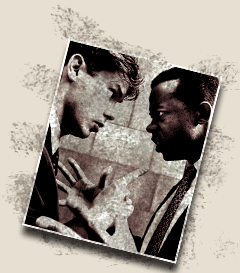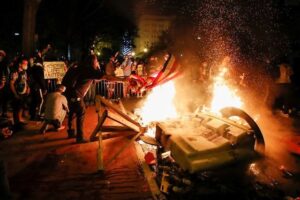 We as a nation have incubated a large class of “untouchables” in today’s America who may only be harmed or disadvantaged by other members of the “untouchable” class. Such a peculiar privilege comes with the hereditary membership (determined solely by birth, that is) in the said class and is supposed to be enforced by the power of state and its agencies. This realization makes it obvious why, although there was no visible trace of “racism” among the causes that led to Breonna Taylor killing by Lexington (KY) police, racial protests and riots erupted across America in its aftermath.
We as a nation have incubated a large class of “untouchables” in today’s America who may only be harmed or disadvantaged by other members of the “untouchable” class. Such a peculiar privilege comes with the hereditary membership (determined solely by birth, that is) in the said class and is supposed to be enforced by the power of state and its agencies. This realization makes it obvious why, although there was no visible trace of “racism” among the causes that led to Breonna Taylor killing by Lexington (KY) police, racial protests and riots erupted across America in its aftermath.
According to the released evidence, including the audio of deliberations of the Grand Jury that was convened to look into this homicide, police had no good idea whom were they shooting at. Should the occupants be different people of different races who acted the same as the actual occupants of the raided residence, the outcome would have most likely been equally tragic. Under such circumstances, the only rational explanation why the racial protests and riots would erupt after the killing was that a member of the “untouchable” class, a black woman, was killed by a cop who was not himself a member of the same class.
This fact made all other members of the “untouchable” class so angry that they, as well as the vocal defenders of their class privilege, had to resort to protests, riots, and similar means of active resistance. From this perspective, there is nothing illogical or irrational in racial protests and riots that followed, anymore.
Unfortunately, the very existence of the said “untouchable” class not only goes against some of the bedrock principles (like equality and liberty) that were spelled-out in the Declaration of Independence but also defies our Framers and Ratifiers’ clear intention to eliminate, once and for all, any gentry or nobility (hereditary privileged classes whose privileges were enforced by the power of state and its agencies) form the American society. These counter-Constitutional effects, in many direct and indirect ways, are detrimental to our Republic as they pose a threat to our individual rights and liberties, particularly to some of those that have been guarded by the Constitution and its several Amendments.
It would be a serious mistake, though, to notice one wrong while pretending to not see another.
It appears that the way the current system of enforcing the law has a serious flaw. When police execute a forced entry into a private residence, the residents, by the law, have the presumed right to defend themselves with deadly weapons if they don’t know who is ramming through the door of their home. What if a bunch of violent robbers and killers were posing as law enforcement while invading someone’s home in order to mug and kill people inside? Do the residents lose their presumed right to defend their lives just because the invading criminals say they are police officers? Do the residents have to accept the risk of being harmed or killed by the invaders first and then seek a legal remedy, later? Such conclusions would be an utter nonsense that goes against individual right to life and defense thereof.
What is clearly needed in America is a system that would protect the innocent by not stripping them of their Constitutional rights during forced home entries, even if such entries were properly executed by law enforcement agents based on a valid search warrants. For otherwise, what would the protection of Amendment IV, “and no Warrants shall issue, but upon probable cause, supported by Oath or affirmation, and particularly describing the place to be searched, and the persons of things to be seized”, mean if the occupants of the searched residence did not have the right to know about the warrant or were unable to authenticate the entrants as law-enforcement agents before the forced entry begun?

AP Photo/Alex Brandon
Of course, some criminals can play such a system to their advantage, very much the same way how many of them play the presumption of innocence and the right to not incriminate oneself. Many will simply claim that they didn’t realize police is after them, and some will, as a result, get away with their lawbreaking. But when we have to chose between the exposure of the innocent to a deadly risk posed by violent criminals masquerading as law enforcement or the restrictions on how the law enforcement executes their search warrants and forced entries, we should opt for the latter. For – if I may paraphrase William Blackstone here – it is far better that ten criminals escape police than that one innocent get killed by the police during the raid. One of the cornerstone principles of our legal system – protection of the innocent that we insist on even if such protection would allow some lawbreakers to avoid punishment for their crimes – doesn’t leave any room for doubt here.
We all should be deeply disturbed with the killing Breonna Taylor but not because a member of an “untouchable” class was killed by a cop who was not a member of that class, or because of police brutality or a lack of adequate training.
We should be disturbed with her tragic and preventable death because it exposes wrongs within some parts of our legal system. And no, it has nothing to do with racism, systemic or otherwise. We all have to unite in our relentless demand to protect the innocent even if, at times, it helps criminals to get away with their crimes. Our God-given rights, including the right of the innocent to defend their lives with whatever means are deemed necessary must not be infringed by the expediency of the law-enforcement policies and the practice and convenience of those who design and implement such policies. When law-enforcement agents ride a private residence then they must at the least, unless, perhaps, a human live is in danger, authenticate themselves positively and with unquestionable credibility to all those present in the said residence and clearly announce the lawful purpose of their entry. And if they don’t then the residents must retain their right to self-defense with any means necessary to stop the intrusion.
I know, there were some court decisions that suggested the opposite conclusion. One was implying that occupants of a private residence did not have the right to resist unlawful entry by the law enforcement. Those decisions were, in opinion of some commentators, unfortunate misinterpretations of the law. They just show how deep the problem I am addressing here is. They facilitate reducing us to subjects of law-enforcement personnel, and lead to erosion of our God-given individual rights and liberties. It is worth noticing that many ancient agrarian societies once offered to their members broad individual liberties. It was when a threat of foreign invasions became so serious that the new and emerging ruling class, the professional defenders of the entire population, asserted power over everybody else to the point that – in a course of a few hundred years – the originally free people were turned into helpless subjects of their defenders, with very little liberty left.
It would be really unwise if we fell into the same trap of trading liberty for safety, again.
October 9, 2020
~ The Author ~
 Mr. Dwyer has been a continuing contributor to the Federal Observer. Mark Andrew Dwyer’s recent columns are posted at:
Mr. Dwyer has been a continuing contributor to the Federal Observer. Mark Andrew Dwyer’s recent columns are posted at:
https://federalobserver.com/?s=mark+andrew+dwyer
Links to his other commentaries can be found here: http://www.oocities.org/readerswrite/List_date.htm
